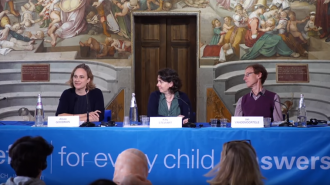
- Our studies
- Our research
- Publications and resources
- Data access and training
- About
- News
- Events
- Get in touch
- Join our mailing list

Welcome to our news and blogs section. Here you’ll find the latest developments and insights from across our longitudinal studies.
Data from the 1970 British Cohort Study (BCS70) Age 51 Sweep are now available to download from the UK Data Service.
At this public lecture Professor Alice Sullivan talks about social class and gender differences in educational attainment and social mobility.
This webinar is jointly organised by the UK Data Service and CeLSIUS as part of the ESRC-funded data resource’s collaborative webinar series, ESRC data resources: discovering data and how to use it.

Equal access to quality education is not only important for children’s individual life chances, it’s vital for their future participation in society, Professor Alissa Goodman told delegates at a UNICEF event in Florence, Italy in October.

Higher education has been less lucrative for women of Generation X than it was for the Baby Boomers, new research reveals.
Girls who are avid gamers are three times more likely to study physical science, technology, engineering and maths (PSTEM) degrees at university, compared to non-gamers.

Children born to immigrant parents tended to trail behind their peers in reading and maths in the 1970s and 1980s, largely due to their social background.

Children from some ethnic minority groups are most likely to aspire to university and aim for well-paid jobs, a new study has found.
The academic advantages associated with a faith school education are short lived, and are mainly explained by home background, new research shows.

Choosing the right field of study is more important than attending an elite university for those aiming to become top earners by middle age, according to new findings from the UCL Institute of Education.
Selected highlights of journal papers and other research published in June using CLS study data.
This webinar introduced users to the new MCS6 (Age 14) time use diary and accelerometry data deposit. A recording of the webinar is available to view on the event page.

Our initial findings from the Millennium Cohort Study Age 14 Sweep cover a range of themes, from mental health to levels of obesity and risky behaviours.
Ryan Bradshaw
Senior Communications Officer
Phone: 020 7612 6516
Email: r.bradshaw@ucl.ac.uk